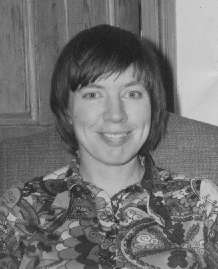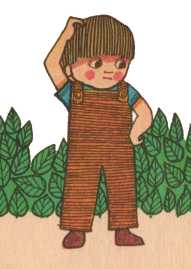
Characters & songs:
Camberwick
Green
Trumpton
Chigley
Interactive bits:
Trumptonshire
Quiz
Picture
download.
Feedback
- your emails
The production team:
Brian
Cant
Gordon
Murray
Freddie
Phillips
Bura
& Hardwick
Alison
Prince
The
Brownfoots
Features:
Episode
guide
Where
are the puppets?
In
the beginning...
The
music of Trumptonshire
Trumptonshire
analysed.
In
search of the real
Trumptonshire
villages
Rubovia
& Gublins
Media:
TV
Web sites
Modern
music references
Videos
TV
trivia books
Trumptonshire
on CD!
More stuff:
Collector's
corner
Book
catalogue
Link
to the T-Web
Credits
copyright & email
Alison Prince wrote the scripts for the
Trumpton series and co-wrote the lyrics for the Trumpton songs. She was
responsible for the "Pugh, (Pugh), Barney McGrew, Cuthbert, Dibble, Grubb!"
catchphrase - probably the most famous line in all of the Trumptonshire
programmes. Here she talks about her involvement with the Trumpton series.

Alison Prince (taken in 1966)
Before the Trumpton series Alison Prince wrote the television series "Joe", a story about a small boy (below) who lived in a busy transport café. With her experience of writing material for young children, the BBC suggested that she should join the Trumptonshire team.

Gordon Murray writes: "Initially Alison
was engaged as a consultant, to checking my pilot scripts and story treatments
for anything that could bring criticism from the educational authorities".
Then, having "quickly assimilated the Trumpton spirit", as he puts it,
he invited her to write the narration and some of the lyrics, and the rest
is as they say...
Things obviously worked out extremely well as the Trumpton series was produced in three months less than it took for the Camberwick Green series, but even so it was only just completed in time for its first transmission in January 1967.
These days Alison Prince is still extremely busy as a successful author, having written books for both children and adults, poetry, fiction and non-fiction, including biographies of "Wind in the Willows" author Kenneth Grahame: "An Innocent in the Wild Wood" and, more recently, of Hans Christien Andersen, "The Fan Dancer".
When not writing books Alison Prince actively
supports new literary talent. She writes occasional reviews of children's
books for the Guardian Newspaper, she sits on the Literature Committee
for the Scottish Arts Council and amongst all this she finds time to visit
schools and judge literary competitions. She now lives on the Isle of Arran,
off the west coast of Scotland.
The Trumpton brief
Alison Prince was asked to write thirteen
stories set in and around the town of Trumpton, and based on the exploits
of a new group of characters called "the Trumpton fire brigade". One important
proviso though – the stories must not involve any smoke, fire or water
!
At the time, the reason for the lack of fire-related action was that these effects were very difficult to animate, but subsequently, the fact that Captain Flack and his men never tackled anything more serious than a potential park bonfire simply adds to the charm of the programmes.
Alison Prince had complete freedom to make
up whatever stories she thought would work within the Trumptonshire world,
and, having children of her own, she knew the type of stories which would
appeal to young minds.
What do you remember from your time
working on the programmes ?
At the start of it all, I was taken to
the studios to see the programmes being filmed. I saw the puppets, and
how they were made to move through stop frame animation, and I was also
shown an early 15 second clip of the firemen sliding down the pole and
lining up on parade. This gave me an idea of what the programmes were all
about.
I remember rehearsing the songs with Brian Cant at Freddie Phillips' house. Freddie wrote these wonderful songs for the characters, which he would play on his guitar. The recordings were made in a room in Freddie’s house which was lined with egg boxes to deaden the sound, but unfortunately it was under the flight path for planes flying into London, so we sometimes had to stop while an aircraft flew overhead, otherwise it would be picked up on the tape!
When did you actually write the scripts
?
I started writing the scripts in early
Summer 1966. I wrote them one at a time, completing each one within a week
- I was a quick worker in those days, and nobody ever edited the stuff.
It was just cut to the right time if necessary and recorded straight away.
I think it took about eight months to write all thirteen episodes.
And do you still have any of the original
scripts ?
Alas, no original script material remains.
I suspect it fell foul of one of my many house movings, when one tends
of course to discard anything that seems over and done with, so sadly -
no.
Did they create specific puppet characters
according to your stories, or did you write stories about characters which
were already made ?
They had some ready made at the beginning
(though not named), and we added more as I dreamed them up.
Did you expect the Trumpton programmes
to be successful ?
No, you could have knocked me down with
a feather ! At the time it was great fun and hard work, but you don’t know
how these things will turn out.
Did you work on any other television
programmes after Trumpton ?
I was involved in a pilot episode of a
programme called "The Seven Sparrows" which was being made for the BBC.
They originally wanted a whole series, but then changed their mind, and
so it never made it to the screen. I also did a week of stories for Jackanory
about going to school in the war, and narrated them.
What do you think of children’s television
these days ?
Modern television programmes are technically
superior but they don’t need to be so complicated. In the days of Trumpton
things were much simpler. We were just a small group of people, and compared
to today’s television makers we were almost amateurs.
And TV is very ‘safe’ these days. They bring in lots of different people such as child psychologists, which is all very well, but a committee can’t be truly creative. Creative people need to be allowed to work freely.
Modern television programmes treat children
as if they have a very short attention span, but this need not be the case.
It can be used as an excuse for the child getting bored through lack of
stimulating material. There is no reason why a reasonably intelligent child
shouldn’t pay attention for long periods of time - given the right material.
When I visit schools to take writing workshops or storytelling classes
I spend at least an hour with them and I don’t have any problems holding
their attention. They just need something to challenge their minds. Of
course they’re going to get bored quickly if the material isn’t very interesting.
This article was written in April 2000. Many thanks to Alison for spending time to discuss her work and for supplying the photograph.